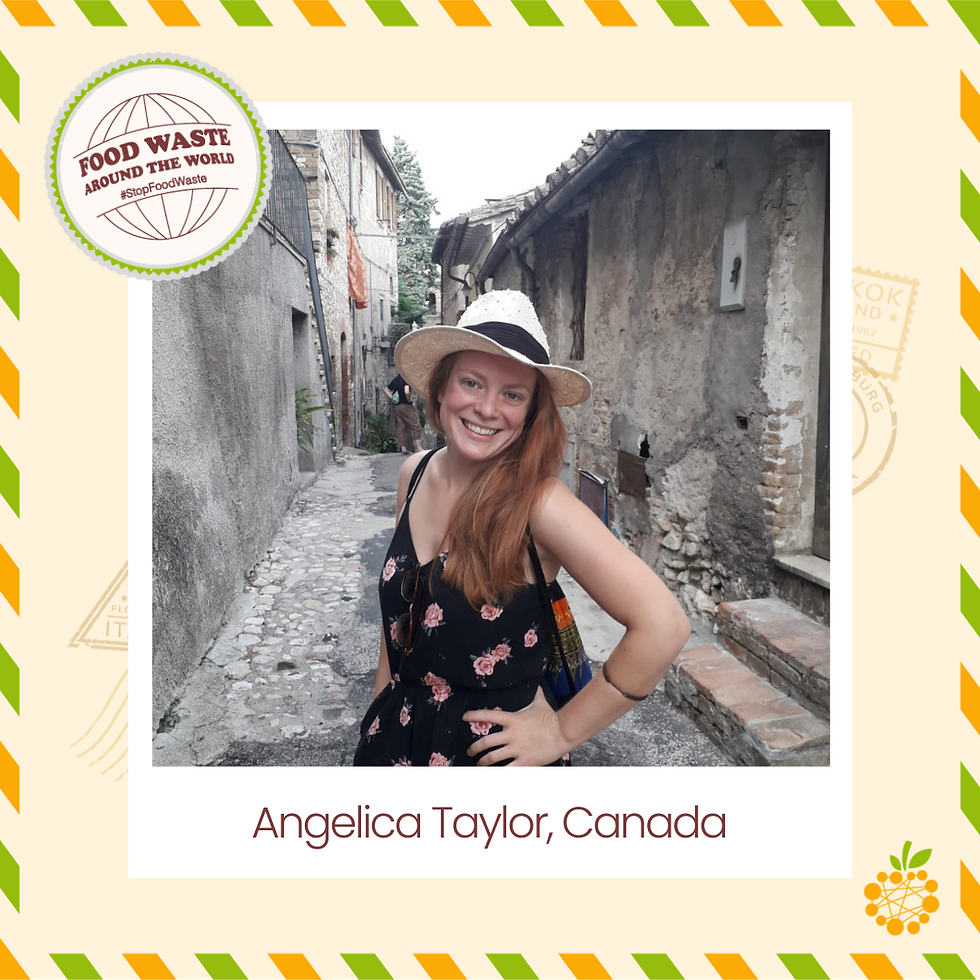Food Waste Around The World, Episode 16: Canada
- FoodCircle Team

- Dec 3, 2020
- 3 min read
Updated: Jun 18, 2021
Food Waste Around the World is a Food Circle’s project aimed at providing information and raising awareness about food waste. The project is designed as a series of interviews with students coming from different countries with the aim of understanding how this issue is tackled and perceived around the world. This is made possible thanks to Sapient, the mother company of Food Circle, which every year offers internships to students from all around the world creating a unique multicultural environment.
Today we speak with Angelica, from Canada!

“Non-governmental organizations are doing most of the work in my opinion”.
Hi Angelica, thank you so much for sharing your time with us today. To start, can you tell me a little bit about yourself and where are you from?
I am Angelica, originally from the west coast of Canada. I have lived abroad for the past 6 years and am currently based in Amsterdam. I’m vegan and I have been raised to never waste food.
That’s great! Can you tell us more about what is happening around food waste? What’s your opinion?
In Canada, there’s not that much food waste since food is expensive and a lot of it has to be imported. But upon researching, I found something interesting from a website: The average Canadian household that amounts to 140 kilograms of wasted food per year at a cost of more than $1,100 per year. For Canada as a whole, that amounts to almost 2.2 million tonnes of edible food wasted each year, costing Canadians an excess of $17 billion!”
Interesting! Could you notice any differences in what you see in Canada compared to the Netherlands? According to food waste?
According to foa.org, it’s estimated that Dutch consumers throw away at least EUR 2,400 million worth of edible food per annum, that is 8%-11% of the food they buy. In kilograms, that amounts to at least 50 kg per person, 120 kg per household. This means that there is slightly more food waste in Canada than in the Netherlands.
Who is really driving the attention or raising awareness on the food waste issue? Is it the government or are they NGOs and small communities?
Non-governmental organizations are doing most of the work in my opinion.
Are you aware of any specific initiatives to address food waste?
I was a part of “Food Not Bombs” which is similar to Taste Before You Waste. They collect food from restaurants and grocery stores to make meals from them and distribute them for free.
Do you think that the government will do more in the future? Do you think that food waste is a priority on their agenda?
No, I don’t think it’s a priority at all. I think the government’s view is that it’s down to the individual to decide what they want to do, and if they buy too much and throw it away it’s their choice. Also, the government is very decentralized since it’s such a big country, and each province (and often each city) has a lot of power in making decisions. Since food shortage isn’t a problem in Canada, food waste doesn’t have major social or economic effects.
What do you think could be the possible next steps to be taken by the different organisations?
Canada is more like the US than Europe in terms of food and supermarkets. There are huge packages and a general capitalist consumption mentality. I think this needs to be addressed in the mainstream. There are so many local initiatives for local food, food coops, farmers’ markets, etc. but this just reaches maybe 5% of society. Most people buy mass produced, cheaper, and less sustainable food. Public education around the importance of eating local food would be beneficial, as well as public service campaigns about food waste. I think there should be more involvement from municipalities on the topic of food. Change needs to start at a local level in communities and cities, but evenly across the country.
That's it, thank you so much for participating!
Thank you too! It was a pleasure.
Interviewer: Ceyda Gezbic
Interviewed: Angelica Taylor
Editor and writer: Ceyda Gezbic Organizations mentioned: Love Food Hate Waste https://lovefoodhatewaste.ca/ FAO




Comments